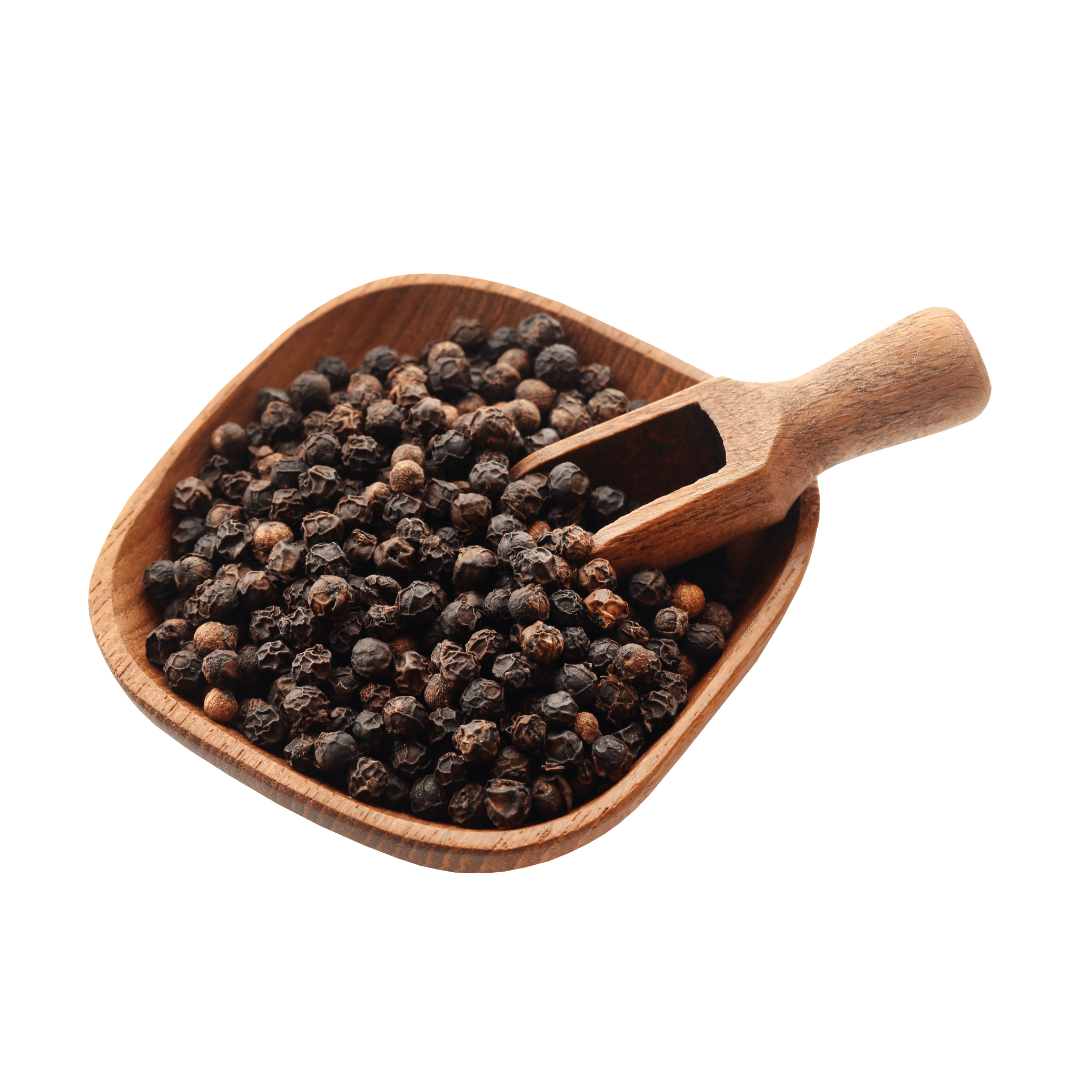About
Pepper is a spice that is derived from the dried fruit of the pepper plant. It is commonly used in cooking to add flavor and spice to a variety of dishes. There are different types of pepper, including black pepper, white pepper, and red pepper, each with its own unique flavor and heat level.
Health Benefits of Pepper:
- Contains antioxidants that may help protect against cellular damage and reduce the risk of chronic diseases such as cancer and heart disease.
- May aid in digestion and improve gut health by increasing the secretion of digestive juices and promoting the growth of beneficial gut bacteria.
- May have anti-inflammatory properties that can help reduce inflammation in the body, which is associated with a variety of health issues.
- May help improve cognitive function and memory by increasing the activity of certain neurotransmitters in the brain.
- May help regulate blood sugar levels by improving insulin sensitivity and reducing the absorption of glucose in the intestines.
List of Diseases that can be Cured by Pepper:
- Pepper may help reduce the risk of certain types of cancer, including colorectal, breast, and prostate cancer.
- Pepper may help lower cholesterol levels and reduce the risk of heart disease.
- Pepper may help improve insulin sensitivity and reduce the risk of type 2 diabetes.
- Pepper may help reduce inflammation and pain associated with conditions such as arthritis.
- Pepper may help improve cognitive function and memory and reduce the risk of neurodegenerative diseases such as Alzheimer’s disease.
Energy, Macronutrients, and Water Content per Serving (50g) of Pepper:
| Nutrient | Amount per Serving |
|---|---|
| Calories | 80 |
| Carbohydrates | 17g |
| Protein | 3g |
| Fat | 1g |
| Fiber | 9g |
| Water | 23g |
Vitamins per Serving (50g) of Pepper:
| Vitamin | Amount per Serving |
|---|---|
| Vitamin A | 48mcg |
| Vitamin B1 | 0.1mg |
| Vitamin B2 | 0.2mg |
| Vitamin B3 | 1.6mg |
| Vitamin B6 | 0.3mg |
| Vitamin B12 | 0mcg |
| Vitamin C | 30mg |
| Vitamin D | 0mcg |
| Vitamin E | 2mg |
| Vitamin K | 7mcg |
| Folate | 7mcg |
| Biotin | 0.5mcg |
Minerals per Serving (50g) of Pepper:
| Mineral | Amount per Serving |
|---|---|
| Calcium | 119mg |
| Iron | 2mg |
| Iodine | 2mcg |
| Zinc | 1mg |
| Magnesium | 36mg |
| Phosphorus | 62mg |
| Potassium | 296mg |
| Sodium | 10mg |
| Chloride | 37mg |
| Copper | 0.1mg |
| Chromium | 0mcg |
| Fluoride | 4mcg |
| Molybdenum | 4mcg |
| Manganese | 0.3mg |
| Selenium | 0.6mcg |
What are the health benefits of pepper?
Pepper is rich in antioxidants, promotes digestion, aids in weight management, and supports respiratory health.
What are the different types of pepper?
There are various types of pepper, including black pepper, white pepper, green pepper, and pink pepper.
Can pepper help with digestion?
Yes, pepper stimulates the production of digestive enzymes and can aid in digestion.
Is pepper beneficial for heart health?
Yes, pepper contains antioxidants that support heart health and help reduce the risk of cardiovascular diseases.
How to choose the best quality pepper?
Look for freshly ground pepper or whole peppercorns that have a strong aroma and vibrant color.
Can pepper be used as a natural remedy?
Pepper has antimicrobial and anti-inflammatory properties, making it a natural remedy for certain ailments.
How to grind whole peppercorns?
Use a pepper grinder or mortar and pestle to grind whole peppercorns into desired coarseness.
Can pepper be used in homemade beauty remedies?
Yes, pepper can be used in homemade face scrubs or hair masks to promote circulation and exfoliation.
How to prepare homemade pepper-infused oils?
Simply add crushed peppercorns to a carrier oil and let it infuse for several weeks, then strain and use as desired.
Is pepper suitable for a low-sodium diet?
Pepper can be a flavorful alternative to salt in a low-sodium diet, enhancing the taste of dishes without adding sodium.
Can pepper enhance the flavor of dishes?
Yes, pepper is known for its ability to add depth and complexity to the flavors of various dishes.
What are the regional variations in pepper usage?
Different cuisines around the world use pepper in unique ways, showcasing diverse culinary traditions.
Can pepper improve nutrient absorption?
Yes, the piperine compound in pepper has been found to enhance the absorption of certain nutrients.
Are there any cultural uses of pepper?
Pepper has a long history of cultural significance, often being used as a symbol of wealth, trade, and culinary excellence.
What are the culinary traditions associated with pepper?
Pepper is an essential ingredient in many cuisines worldwide, adding depth and spiciness to dishes.
Does pepper have antibacterial properties?
Yes, certain compounds in pepper exhibit antibacterial properties, which can help fight against harmful bacteria.
What is the role of pepper in traditional medicine?
Pepper has been used in traditional medicine for its potential benefits in treating respiratory issues, digestive problems, and more.









